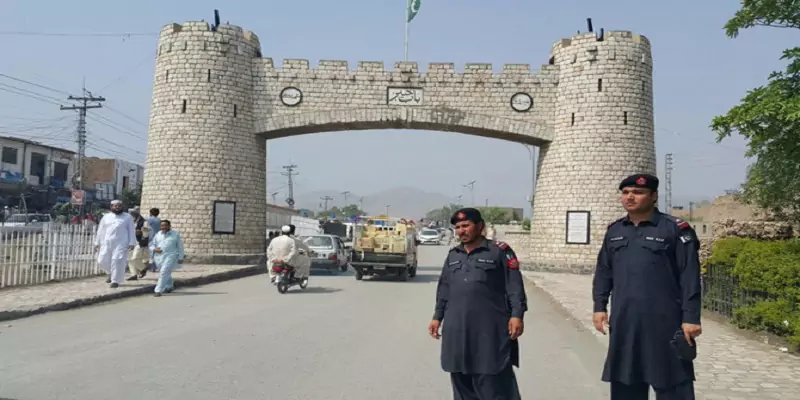Peshawar
Peshawar, the capital city of the Khyber Pakhtunkhwa (KPK) province in Pakistan, is a captivating blend of history, culture, and modernity. This comprehensive exploration aims to unravel the multifaceted layers of Peshawar, delving into its geography, history, culture, economy, education, landmarks, and its pivotal role in the broader context of KPK.
Nestled in the northwestern region of Pakistan, Peshawar is strategically located at the crossroads of South Asia and Central Asia. It lies on the eastern end of the historic Khyber Pass, a vital route that connects the Indian subcontinent to Central Asia. The city is bordered by the rugged mountains of the Khyber Agency, adding to its scenic charm. The Kabul River flows through Peshawar, enriching the surrounding plains and contributing to the city's fertile landscape.
Peshawar boasts a history that stretches back millennia, with traces of ancient civilizations imprinted on its landscape. The city has been a melting pot of cultures, witnessing the influence of the Persian Empire, Mauryan and Gupta periods, and the Greco-Bactrian Kingdom. During the Gandhara civilization, Peshawar emerged as a center for Buddhist art and learning. Over the centuries, it has been a focal point for various empires, including the Persian, Greek, Kushan, and Mughal, shaping its diverse cultural tapestry.
Peshawar is a kaleidoscope of cultural influences, primarily reflecting the Pashtun heritage that dominates the region. The Pashto language, traditional music, dance, and colorful festivals are integral to Peshawar's cultural identity. The bustling bazaars showcase a vibrant display of handicrafts, carpets, traditional attire, and the aromatic spices that characterize the local cuisine. Peshawar's cultural ethos is characterized by hospitality, with locals known for their warmth and generosity.
The economy of Peshawar is dynamic, fueled by trade, agriculture, and industry. The historic Qissa Khwani Bazaar, or the "Storytellers' Market," has been a hub of commerce for centuries, attracting traders from different parts of the world. Agriculture in the surrounding plains is vital, producing crops like wheat, sugarcane, and fruits. Peshawar is also an industrial center, with sectors such as textiles, leather, and handicrafts contributing significantly to its economic vibrancy.
Peshawar has a rich educational tradition, with institutions that have played a pivotal role in shaping the intellectual landscape of KPK. The University of Peshawar, founded in 1950, stands as a testament to the city's commitment to higher education. Numerous colleges and schools cater to the educational needs of the diverse population. Peshawar's literary and intellectual legacy has produced renowned poets, writers, and scholars.
Landmarks and Attractions:
1. Peshawar Museum:
A repository of Gandhara art and artifacts, the Peshawar Museum showcases the rich history of the region. It houses sculptures, coins, and relics dating back to ancient civilizations.
2. Bala Hisar Fort:
Dominating the Peshawar skyline, Bala Hisar Fort has witnessed centuries of history. Its commanding presence reflects the strategic significance it held in different eras.
3. Qissa Khwani Bazaar:
This historic market, dating back to the Mughal era, is a bustling center where traders and storytellers once converged. It remains a vibrant hub for commerce and cultural exchange.
4. Mahabat Khan Mosque:
A masterpiece of Mughal architecture, Mahabat Khan Mosque stands as a testament to the city's cultural and religious diversity.
5. Khyber Pass:
The legendary Khyber Pass, connecting Peshawar to Afghanistan, is not only a crucial trade route but also a historic gateway with tales of conquerors and traders.
Peshawar, while not traditionally considered a tourist destination, has immense historical and cultural appeal. The city's landmarks, coupled with the warm hospitality of its people, make it an intriguing stop for those exploring the rich heritage of KPK. The recent efforts to promote cultural tourism are gradually bringing Peshawar into the spotlight.Peshawar experiences a hot desert climate, with scorching summers and mild winters. The summer temperatures can soar, creating a dry and arid environment. Winters, on the other hand, are relatively mild, offering a more pleasant climate for outdoor activities.
Peshawar's infrastructure has undergone improvements in recent years, with a focus on enhancing connectivity and basic amenities. Well-maintained roads connect the city to major centers, and public transportation options are readily available. The healthcare system is supported by modern hospitals and medical facilities.
As Peshawar looks toward the future, there is a concerted effort to balance urban development with the preservation of its cultural and historical heritage. The city aims to attract more investments, promote sustainable practices, and further develop its educational and healthcare sectors. The focus is on fostering a community that embraces progress while staying connected to its cultural roots.
Peshawar stands as a testament to the resilience of a city that has witnessed the passage of time and the ebb and flow of history. Its rich cultural heritage, diverse landscapes, and economic vitality make it a distinctive and integral part of the Khyber Pakhtunkhwa province. As Peshawar continues to evolve, it remains a captivating destination for those seeking to explore the intersection of tradition and modernity in Pakistan.

